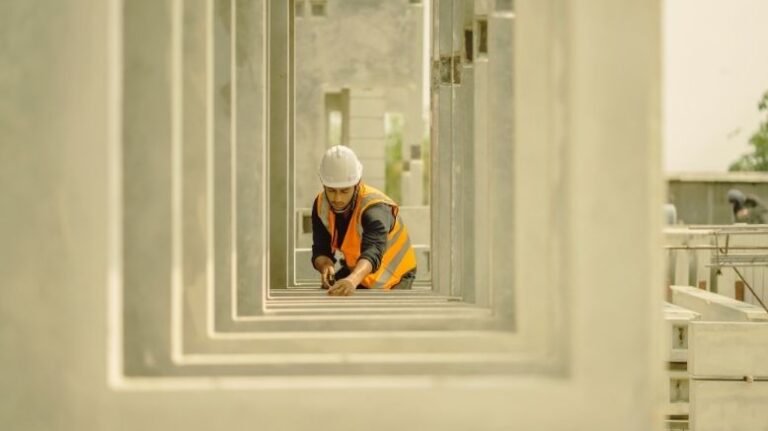— 5 min read
Construction Quality Management 101

Last Updated Oct 9, 2025

Kristen Frisa
Contributing Writer
113 articles
Kristen Frisa is a contributing writer for Procore. She also contributes to a variety of industry publications as a freelance writer focused on finance and construction technology. Kristen holds a Bachelor of Arts in Philosophy and History from Western University, with a post-graduate certificate in journalism from Sheridan College. She lives in Ontario, Canada.
Last Updated Oct 9, 2025

In construction, quality management is the systematic process of ensuring every aspect of a project meets a defined set of standards. As projects grow in complexity, the role of quality management has expanded beyond technical specifications to include regulatory compliance, safety, and client satisfaction.
This guide provides an overview of construction quality management, from its core components and challenges to best practices for improving project outcomes.
Table of contents
What is construction quality management?
Construction quality management is a framework that ensures a project is built according to its specified requirements. It involves defining quality standards, implementing processes to meet those standards, and verifying that the completed work is in conformance.
Effective quality management also helps ensure that the project is finished on time while adhering to the project scope, budget, and all relevant safety standards.
Key components of a construction quality management program
A successful quality management program is built on four key components that work together throughout the project lifecycle.
Quality planning
Quality planning is the process of defining a project’s quality standards and objectives. This includes developing the procedures and assigning the responsibilities needed to achieve those goals.
Quality assurance
Proactive activities and processes designed to prevent defects before they happen. Quality assurance (QA) focuses on improving construction processes through training, data analysis and documentation to make sure work is done correctly the first time.
Quality control
The inspection-based process of monitoring and measuring project results to confirm compliance with quality standards. Quality control (QC) activities are designed to identify and correct issues as they arise during construction.
Construction quality assurance and quality control are interlocking components of quality management, each serving specific functions to facilitate the successful delivery of a project.

Julia Tell
Contributing Writer
Procore Technologies
How construction quality is evaluated
Quality is measured by the project’s ability to meet the requirements laid out in the contract documents. This includes completing work on schedule, within budget, and according to the plans and specifications.
Construction quality is evaluated through a combination of inspections, testing, and audits.
- Inspections verify that work at various stages complies with project specifications and building codes.
- Testing makes sure materials, components and systems meet the required performance standards.
- Audits assess the effectiveness of the quality management processes themselves.
The Importance of Construction Quality Management
A commitment to quality has a direct impact on nearly every measure of project success. In a competitive industry, delivering high-quality work is essential for building a strong reputation and a sustainable business.
Better efficiency
Proactive quality assurance minimizes the time and resources spent correcting deficiencies, helping keep the project on schedule and protecting profit margins.
Better safety
Effective quality management is directly linked to jobsite safety. Adherence to established processes and compliance with regulations reduces the likelihood of accidents and structural failures.
Better client relationships
A well-executed quality management plan demonstrates a contractor’s commitment to excellence and reliability, leading to repeat business and positive referrals.
Common challenges in construction quality management
Project teams face several challenges when implementing a quality management program.
Project complexity
Large-scale projects often involve dozens of stakeholders and subcontractors, making consistent quality oversight difficult. As the size and complexity of a project increase, so does the need for robust management systems and clear communication across all teams.
Resource limitations
Quality management programs can be affected by limited resources — including budget, personnel and time. Teams working within tight budgets may face pressure to reduce spending in areas like inspections or training, making it a challenge to balance thorough quality management with available resources.
Poor communication
Miscommunication among project stakeholders is a common source of quality issues.
When expectations are not clearly defined or documented, misunderstandings can lead to errors and disputes. Establishing clear communication channels is essential for managing quality effectively.
Manu GC firms still struggle [with communication]. Some haven’t adopted technology to streamline communication. Others have — but haven’t seen the expected results. Sometimes, for example, a response to a request for information (RFI) might come in minutes thanks to the technology in play. But in other cases, it might take weeks, maybe because of duplicate communication or a missed ping by a stakeholder.

Blake Johnson
Manager, Strategic Product Consultants, General Contractors
Procore
Competing Priorities
Construction project management often involves balancing the competing demands of cost, schedule, and quality. While using higher-quality materials or conducting more frequent inspections can lead to better outcomes, these choices often come with higher upfront costs. Navigating these trade-offs requires strategic decisions to achieve an optimal balance.
7 ways to improve quality management on construction projects
Creating better quality management involves implementing structured strategies that allow teams to meet their objectives consistently.
Define clear quality objectives.
Begin by establishing quality objectives that align with project goals and client expectations. These objectives create a benchmark for measuring success and guide all quality-related activities.
Establish standardized systems.
Implement processes and workflows that support quality objectives. This includes creating clear communication protocols and procedures so everyone is working toward the same standard of quality.
Create detailed checklists.
Develop checklists and inspection forms for work at various stages of the project. A structured approach helps ensure all critical elements are verified and meet established standards.
Promote accountability.
Clearly define roles and responsibilities within the quality management framework. When team members understand their specific role in maintaining quality, it is easier to hold them accountable for their work.
Document and track everything.
Maintain thorough documentation of all quality management activities. Tracking this data allows teams to identify trends, and modern construction management technology can streamline the process by centralizing inspection reports, test results and corrective actions.
Invest in training.
Provide continuous training and development programs to enhance the skills of the project team. Well-trained employees are better equipped to identify and resolve potential quality issues proactively.
Conduct frequent risk assessments.
Regularly identify and assess potential quality risks throughout the project. Understanding where problems are likely to occur allows teams to implement mitigation strategies through a process of construction risk management.
Stay updated on what’s happening in construction.
Subscribe to Blueprint, Procore’s free construction newsletter, to get content from industry experts delivered straight to your inbox.

Building a culture of quality
While the concept of quality management is straightforward, executing it on large, complex projects requires significant planning and coordination. But project teams can use quality management skills to make sure work always complies with the agreed-upon standards by setting clear requirements and implementing robust checks and balances.
Successful quality management depends on a team-wide commitment to improvement. When companies encourage a quality-focused culture through communication and collaboration, every team member has a better shot at recognizing deficiencies and working toward better outcomes.
Was this article helpful?
Thank you for your submission.
100%
0%
You voted that this article was . Was this a mistake? If so, change your vote
Scroll less, learn more about construction.
Subscribe to The Blueprint, Procore’s construction newsletter, to get content from industry experts delivered straight to your inbox.
By clicking this button, you agree to our Privacy Notice and Terms of Service.
Thank you!
You’re signed up to receive The Blueprint newsletter from Procore. You can unsubscribe at any time.
Categories:
Written by

Kristen Frisa
Contributing Writer | Procore
113 articles
Kristen Frisa is a contributing writer for Procore. She also contributes to a variety of industry publications as a freelance writer focused on finance and construction technology. Kristen holds a Bachelor of Arts in Philosophy and History from Western University, with a post-graduate certificate in journalism from Sheridan College. She lives in Ontario, Canada.
View profileExplore more helpful resources

6 Tips to Turn Construction Culture Into Daily Practice
Every construction company has a culture. Whether it’s intentional or not. The difference lies in how that culture shows up on the job. In the first article of this series on...

Turning Values into Workflows: How a GC Firm Operationalized Culture
Culture isn’t just about what companies believe — it’s about how those beliefs show up in day-to-day work. When culture is embedded into operations, it becomes something teams can rely...

How a Successful GC Firm Turned Personalities into Culture
The culture at Ryan Gootee General Contractors (RGGC), a successful construction firm based in New Orleans, was never something the company had to invent. It was always there. Woven into...

Rise of the Super-Sub: Mastering Supply Chain & Logistics for Offsite Construction
Modern construction projects come with ever-increasing demands. Owners want to see more complex builds completed on tighter schedules. At the same time, general contractors (GCs) face challenges like the ongoing...
Free Tools
Calculators
Use our calculators to estimate the cost of construction materials for your next project.
Templates
Find a template to help you with your construction project tasks.
Material Price Tracker
Get the latest U.S. retail prices and view historical trends for common building materials.
Glossary
Explore key terms and phrases used in the industry.
